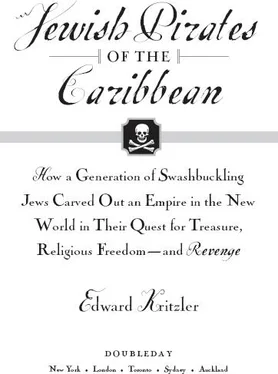Edward Kritzler - Jewish Pirates of the Caribbean
Здесь есть возможность читать онлайн «Edward Kritzler - Jewish Pirates of the Caribbean» весь текст электронной книги совершенно бесплатно (целиком полную версию без сокращений). В некоторых случаях можно слушать аудио, скачать через торрент в формате fb2 и присутствует краткое содержание. Год выпуска: 2008, ISBN: 2008, Издательство: Knopf Doubleday Publishing Group, Жанр: Старинная литература, на английском языке. Описание произведения, (предисловие) а так же отзывы посетителей доступны на портале библиотеки ЛибКат.
- Название:Jewish Pirates of the Caribbean
- Автор:
- Издательство:Knopf Doubleday Publishing Group
- Жанр:
- Год:2008
- ISBN:9780385528368
- Рейтинг книги:3 / 5. Голосов: 1
-
Избранное:Добавить в избранное
- Отзывы:
-
Ваша оценка:
- 60
- 1
- 2
- 3
- 4
- 5
Jewish Pirates of the Caribbean: краткое содержание, описание и аннотация
Предлагаем к чтению аннотацию, описание, краткое содержание или предисловие (зависит от того, что написал сам автор книги «Jewish Pirates of the Caribbean»). Если вы не нашли необходимую информацию о книге — напишите в комментариях, мы постараемся отыскать её.
Jewish Pirates of the Caribbean — читать онлайн бесплатно полную книгу (весь текст) целиком
Ниже представлен текст книги, разбитый по страницам. Система сохранения места последней прочитанной страницы, позволяет с удобством читать онлайн бесплатно книгу «Jewish Pirates of the Caribbean», без необходимости каждый раз заново искать на чём Вы остановились. Поставьте закладку, и сможете в любой момент перейти на страницу, на которой закончили чтение.
Интервал:
Закладка:
23. Keniston, Francisco de los Corbos , 176.
24. Cundall and Pietersz, Jamaica Under the Spaniards, 12.
25. Padron Morales, Spanish Jamaica, trans. Patrick E. Bryan (Kingston, Jamaica: Ian Randle Publishers, 2003), Appendix 6, 278–79: In February 1537, the king gave in to her demand for power over the church: “Upon our consideration…that the resolution of these lawsuits is in doubt…on behalf of Dona Maria de Toledo…and Admiral Don Luis Columbus, her son…we grant leave to thee and thy successors whereby thou mightst appoint persons to the Abbacy, including its revenues, as well as to other offices in the churches on the aforesaid island.”
26. Ibid., 65: The royal edict also granted the family twenty-five square leagues in the province of Veragua, where Columbus had obtained the sixty-three gold pendants, but the land proved to be “swampy and unprofitable” and nineteen years later Don Luis gave up Veragua in return for an annual payment of seventeen thousand ducats.
27. Cundall and Pietersz, Jamaica Under the Spaniards, 13.
28. The Jewish Encyclopedia (JewishEncyclopedia.com), “Antwerp” (by Richard Gottheil): “Antwerp became the center of Portugal’s East Indian trade, and many of the rich merchants and bankers of Lisbon had branch houses there. In 1536, according to a document in the Belgian state archives, Charles V directed the magistrates of Antwerp to allow conversos to settle Antwerp.”
29. Tolkowsky They Took to the Sea, 203.
30. Hirschberg, A History of the Jews of North Africa, vol. 2, 9.
31. Christopher and Jean Serpell, Elba and the Tuscan Archipelago (London: Jonathan Cape, 1977).
32. In his remaining years, Charles made a series of abdications that left the Hapsburg dominions divided between Austria and Spain. By 1555 he had given his son Philip Naples, Milan, and the Netherlands, and in 1556 retired to the monastery of Yuste.
33. Christopher Hare, A Great Emperor: Charles V, 1519–1558 (New York: Charles Scribner’s Sons, 1917), 199.
34. Gertrude Von Schwarzenfeld, Charles V, Father of Europe (Chicago: Henry Regnery Co., 1957), 278–79: On his bedside table were a Bible, his favorite heraldic romance Il Cortegiano, and Machiavelli’s The Prince. On penance days, he “beat himself with the rough pieces of a knotted rope till he had worn away the knots.”
35. Tolkowsky, They Took to the Sea, 183.
36. Jane S. Gerber, Jewish Society in Fez (Leiden: E. J. Brill, 1980), 166–69.
Chapter Four: Samuel Palache, the Pirate Rabbi
1. The family’s rabbinical lineage goes back to the tenth century, when Moshe ben Chanoch, a famous Talmudic scholar from Babylon, was captured by pirates and taken as a slave to Córdoba. Redeemed by the community, he became its rabbi, married into the Palache family, and along with his son established Spain as a center of Torah study. Down to Samuel’s time, family members rose to prominence as rabbis in Italy, Turkey, and Greece. Jewish Encyclopedia, “Palache” Hirschberg, A History of the Jews in North Africa, vol. 2, 212n (extensive note on Palache rabbis).
2. Mercedes García-Arenal and Gerard Wiegers, A Man of Three Worlds: Samuel Palache, a Moroccan Jew in Catholic and Protestant Europe, trans. Martin Beagles (Baltimore: John Hopkins University Press, 2003), 24–25.
3. The roving rabbi’s influence on the boys brings to mind the uncle in Death of a Salesman.
4. H. Graetz, Popular History of the Jews, vol. 5, trans. Rabbi A. B. Rhine, ed. Alexander Harkavy (New York: Hebrew Publishing Company, 1937), 55: David Jesurun, “the boy poet,” gave the city the sobriquet “New Jerusalem” when, on the run from the Inquisition, he reached the safety of Amsterdam and, inspired, wrote his paean to it.
5. H. I. Bloom, The Economic Activities of the Jews in Amsterdam in the 17th and 18th Centuries (Williamsport, Pa.: Baynard Press, 1937), 78n23: “The Jews of Amsterdam are so expert that, after disguising the merchandise by mingling it with other goods, or packing it in another way or remarking it, they are not afraid to go to certain Portuguese ports and resell the goods there.”
6. García-Arenal and Wiegers, A Man of Three Worlds, 5: The duke wrote that even if they did seduce a few New Christians they were less a threat to His Majesty than the many Barbary Jews in his domain who were spies and should be expelled.
7. Ibid., 6.
8. Ibid., 5.
9. Ibid., 10.
10. Ibid., 11.
11. Isidore Harris, Jewish Historical Society of England, “A Dutch Burial Ground and Its English Connections,” 113.
12. Henrich Graetz, History of the Jews, vol. 4 (Philadelphia: Jewish Publication Society of America, 1941), 663.
13. John J. Murray, Amsterdam in the Age of Rembrandt (Norman: University of Oklahoma Press, 1967), 21.
14. García-Arenal and Wiegers, A Man of Three Worlds, 56.
15. Ibid., 55.
16. Ibid., 76.
17. Ibid., 77.
18. Hirschberg, A History of the Jews in North Africa, vol. 2, 214–15.
19. García-Arenal and Wiegers, A Man of Three Worlds, 72.
20. Odette Vlessing, “Samuel Palache: Earliest History of Amsterdam Portuguese Jews,” in Dutch Jewish History, vol. 3 (Jerusalem: The Institute for Research on Dutch Jewry, 1993), 52.
21. Ibid., 50; Jewish Encyclopedia, “Palache.”
22. Hirschberg, A History of the Jews in North Africa, vol. 2.
23. David Carrington, “A Jewish Buccaneer,” Jewish Chronicle, November 4, 1955: Palache obtained from the Netherlands permission to “levee and raise so many mariners and seafaring men as he shall have need with license from the States General…to Barbary where Palache went up to the King…and [received] a commission from him to go to sea and take all Spaniards that he could meet with.”
24. García-Arenal and Wiegers, A Man of Three Worlds, 85.
25. Ibid., 77–79. In February 1612, Sidan sent an urgent plea to Samuel to hurriedly come to his aid with two ships and a thousand men. The sultan was desperate. His brother, Ibn Abu Mahalli, a radical Islamist warlord hoped to rid the nation of Jews who were overrunning his realm. Mahalli was given undue credibility in July when Morocco’s Dutch ambassador recommended the States General recognize the self-styled “new king” as Morocco’s ruler. When his report reached the Netherlands, Samuel’s brother Joseph and nephew Moses refuted the ambassador’s claim. The following year, Mahalli was killed by an ally of Sidan, and the Dutch diplomat, charged with treason, was briefly imprisoned. Sidan was again recognized as Morocco’s supreme ruler.
26. García-Arenal and Wiegers, A Man of Three Worlds, 85.
27. Vlessing, “Samuel Palache,” 52.
28. García-Arenal and Wiegers, A Man of Three Worlds, 88–89.
29. Ibid., 90.
30. Ibid., 91.
31. Jewish Quarterly Review 14 (1902), 358, reprints, letter from London, dated November 4, 1614, from John Chamberlain to his friend Sir Dudley Carleton, the British ambassador at Venice: “Here is a Jew Pirate arrested that brought three prizes of Spaniards into Plymouth…he shall likely pass out of here well enough for he has league and license under the King’s hand for his free egress and regress which was not believed till he made proof of it.” See also the Acts of the Privy Council, December 23, 1614, Privy Council to Sir William Craven, Alderman: “The Lordships give order for the restraint and safe keeping of Samuel Palache, a Jew, lately arrived at Plymouth [charged with] committing piracy and outrage upon the subjects of the King of Spain…Palache hath alleged that he is a servant unto the King of Barbary, and by him employed as his agent unto the States United, and that from the said King his master he had received commission for the arming and setting forth of ships of war, by virtue of which commission (together with license of the States United) he pretends the fact to be justifiable and no way with the compass of piracy.”
Читать дальшеИнтервал:
Закладка:
Похожие книги на «Jewish Pirates of the Caribbean»
Представляем Вашему вниманию похожие книги на «Jewish Pirates of the Caribbean» списком для выбора. Мы отобрали схожую по названию и смыслу литературу в надежде предоставить читателям больше вариантов отыскать новые, интересные, ещё непрочитанные произведения.
Обсуждение, отзывы о книге «Jewish Pirates of the Caribbean» и просто собственные мнения читателей. Оставьте ваши комментарии, напишите, что Вы думаете о произведении, его смысле или главных героях. Укажите что конкретно понравилось, а что нет, и почему Вы так считаете.












